
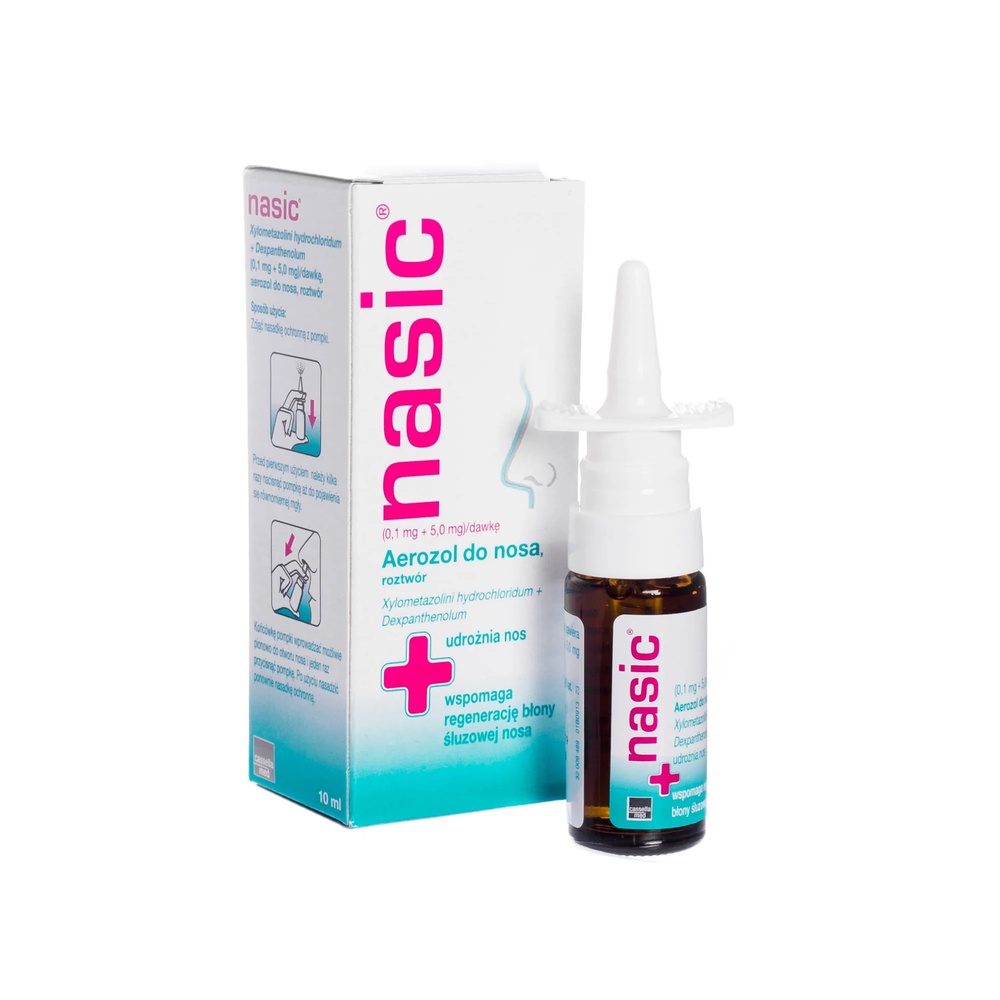
Nasic

Ask a doctor about a prescription for Nasic

How to use Nasic
Package Leaflet: Information for the Patient
nasic, (0.1 mg + 5.0 mg)/dose, nasal spray, solution
Xylometazoline hydrochloride+ Dexpanthenol
Read the package leaflet carefully before using the medicine, as it contains
important information for the patient.
This medicine should always be used exactly as described in this package leaflet for the patient or as advised by your doctor or pharmacist.
- You should keep this leaflet, so you can read it again if you need to.
- If you need advice or further information, you should speak to your pharmacist.
- If you get any side effects, talk to your doctor or pharmacist. This includes any possible side effects not listed in this leaflet. See section 4.
- If after 7 days there is no improvement or you feel worse, you should contact your doctor.
Table of Contents of the Package Leaflet
- 1. What is nasic and what is it used for
- 2. Important information before using nasic
- 3. How to use nasic
- 4. Possible side effects
- 5. How to store nasic
- 6. Contents of the pack and other information
1. What is nasic and what is it used for
nasic is a nasal spray. It contains two active substances: xylometazoline hydrochloride and dexpanthenol. Xylometazoline constricts blood vessels, which leads to a reduction in swelling and congestion of the nasal mucosa. The reduction in congestion of the nasal mucosa makes it easier for patients with symptoms of nasal congestion due to a cold and after nasal surgery to breathe through their nose.
Dexpanthenol is a derivative of pantothenic acid, a vitamin that accelerates wound healing and participates in the regeneration of mucous membranes.
nasic is used for the symptomatic treatment of nasal congestion due to a cold and after nasal surgery - to stimulate the healing of the mucous membrane and improve nasal patency.
nasic is intended for use in adults and children over 6 years of age.
If after 7 days there is no improvement or you feel worse, you should contact your doctor.
2. Important information before using nasic
When not to use nasic:
- if you are allergic (hypersensitive) to xylometazoline hydrochloride, dexpanthenol or any of the other ingredients of nasic (listed in section 6),
- in children under 6 years of age,
- if you have atrophic rhinitis (a condition where the nasal mucosa is dry and forms crusts),
- after surgical removal of the pituitary gland through the nose (transsphenoidal hypophysectomy) and after other surgical procedures that expose the dura mater.
nasic contains benzalkonium chloride as a preservative, so it should not be used by people with known hypersensitivity to this substance.
Warnings and precautions
You should consult your doctor before using nasic if:
- -you are taking monoamine oxidase inhibitors (MAOIs) or other medicines that may cause an increase in blood pressure,
- -you have increased intraocular pressure, especially if you have narrow-angle glaucoma,
- -you have severe cardiovascular diseases (e.g., coronary heart disease, hypertension),
- -you have heart disease (e.g., long QT syndrome),
- -you have a pheochromocytoma (a tumor of the adrenal gland),
- -you have metabolic disorders (e.g., hyperthyroidism, diabetes),
- -you are allergic to sympathomimetic substances; using the medicine in people with such an allergy may cause insomnia, dizziness, tremors, cardiac arrhythmias, and increased blood pressure,
- -you have a metabolic disorder called porphyria,
- -you have benign prostatic hyperplasia (enlarged prostate).
Due to the risk of atrophy of the nasal mucosa, the use of the medicine in chronic rhinitis should be carried out under medical supervision.
Children
You should avoid long-term use or use in higher doses than recommended, especially in children. Higher doses should only be given after consulting a doctor.
nasic contains a concentration of active substances intended for adults and older children. Therefore, it is not suitable for infants and children under 6 years of age. For children between 2 and 6 years of age, a nasal spray with a lower concentration of xylometazoline hydrochloride - the active substance that constricts the mucous membrane - is available.
nasic and other medicines
You should tell your doctor or pharmacist about all medicines you are taking or have recently taken, as well as any medicines you plan to take.
Concomitant use of nasic with medicines used in depression (monoamine oxidase inhibitors (MAOIs) of the tranylcypromine type or tricyclic antidepressants), as well as with medicines that increase blood pressure, may cause an increase in blood pressure as a result of the effect on the cardiovascular system.
Pregnancy, breastfeeding, and fertility
If you are pregnant or breastfeeding, think you may be pregnant, or plan to have a child, you should consult your doctor or pharmacist before using any medicine.
Studies on the effect of the medicine on fetal development are insufficient, so nasic should not be used in pregnant women.
It is not known whether xylometazoline hydrochloride passes into breast milk, so nasic should not be used by breastfeeding women.
Driving and using machines
If nasic is used as recommended, it is not expected to have a negative effect on the ability to drive vehicles and operate machines.
nasic contains benzalkonium chloride.
The medicine contains 0.02 mg of benzalkonium chloride in one dose of the spray (0.1 ml of the solution).
Benzalkonium chloride may cause irritation or swelling inside the nose, especially if used for a long time.
You should inform your doctor or pharmacist if you experience discomfort while using nasic.
3. How to use nasic
This medicine should always be used exactly as described in this package leaflet for the patient or as advised by your doctor or pharmacist. If you are unsure, you should consult your doctor or pharmacist.
Recommended dose:
Unless your doctor has advised otherwise, adults and children over 6 years of age:
one dose of the medicine into each nostril, if necessary up to three times a day.
Dosage depends on individual sensitivity and response to the medicine.
You should not use higher doses than recommended.
Duration of use:
You should not use nasic for more than 7 days, unless your doctor has explicitly advised you to continue using it.
Repeated use should only occur after a few days' break.
When using in children, you should always consult your doctor regarding the duration of use.
Continuous use of nasic may lead to chronic swelling and potentially cause atrophy of the nasal mucosa.
Patients with increased intraocular pressure (with glaucoma, especially with narrow-angle glaucoma) should consult their doctor before using nasic.
nasic should not be used in children under 6 years of age.
If the effect of nasic is too strong or too weak, you should consult your doctor or pharmacist.
Method of use:
nasic is intended for intranasal use.
Glass bottle with a built-in spray pump
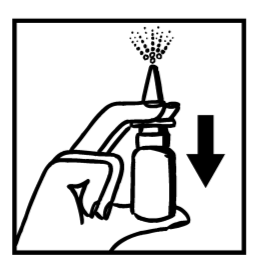
Remove the protective cap from the pump. Before first use, press the pump several times until a uniform mist appears. For subsequent applications, the medicine is immediately ready for use.
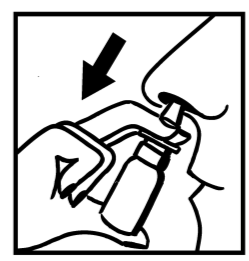
Insert the pump tip vertically into the nostrils and press the pump once. For hygiene reasons, you should wipe the pump tip after use and put the protective cap back on.
or
Glass bottle with a screw-on spray pump
Due to the risk of infection transmission, the medicine packaging should only be used by one patient.
Using a higher dose of nasic than recommended
If you use a higher dose of nasic than recommended or accidentally take it orally, the following symptoms may occur: pupil constriction, pupil dilation, nausea, vomiting, blue discoloration of the skin and mucous membranes, including the lips (cyanosis), fever, paleness, convulsions, cardiovascular disorders, e.g., arrhythmia (accelerated heart rate (tachycardia), slow heart rate (bradycardia)), cardiac arrhythmias, circulatory collapse, cardiac arrest, high blood pressure, respiratory disorders (pulmonary edema, respiratory distress), psychiatric disorders.
The following may also occur: drowsiness, decreased body temperature, decreased heart rate, blood pressure drop similar to shock, apnea, and loss of consciousness (coma).
If you suspect that you have used a higher dose of nasic than recommended, you should contact your doctor immediately. If necessary, your doctor will suggest appropriate treatment.
Missing a dose of nasic
You should not use a double dose to make up for a missed dose.
You should continue treatment as described in the instructions for use.
If you have any further doubts about using this medicine, you should consult your doctor or pharmacist.
4. Possible side effects
Like all medicines, nasic can cause side effects, although not everybody gets them.
The frequency of side effects is defined as follows:
Very common: more than 1 in 10 people,
Common: less than 1 in 10 people but more than 1 in 100 people,
Uncommon: less than 1 in 100 people but more than 1 in 1,000 people,
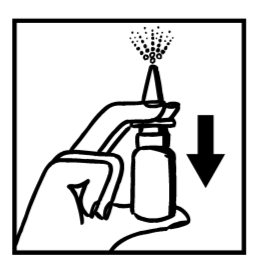
Remove the longitudinal protective cap from the spray pump. Unscrew the cap from the glass bottle and screw on the spray pump tip. Then remove the protective cap from the pump tip.
Before the first administration, press the pump several times until a uniform mist is obtained.
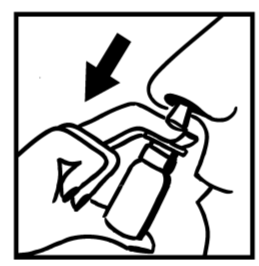
Insert the pump tip vertically into the nostril and press the pump to release one dose of the medicine, while gently inhaling through the nose. In the same way, administer the dose of the medicine into the other nostril. After use, clean the pump tip and put the protective cap back on.
For subsequent administrations, the pump will always be ready for further use.
Rare: less than 1 in 1,000 people but more than 1 in 10,000 people,
Very rare: less than 1 in 10,000 people,
Frequency not known: frequency cannot be estimated from the available data.
Nervous system disorders:
Very rare: excitement, insomnia, fatigue (e.g., drowsiness, sedation), headache, hallucinations (especially in children)
Cardiac disorders:
Rare: palpitations, accelerated heart rate (tachycardia)
Very rare: cardiac arrhythmias (heart rhythm disorders)
Vascular disorders:
Rare: high blood pressure (hypertension)
Respiratory, thoracic, and mediastinal disorders:
Very rare: after the effect of the medicine has stopped, increased swelling of the nasal mucosa, nosebleeds
Frequency not known: feeling of burning and dryness of the nasal mucosa, sneezing
Musculoskeletal and connective tissue disorders:
Very rare: cramps (especially in children)
Immune system disorders:
Uncommon: hypersensitivity reactions (e.g., skin and mucous membrane swelling, skin rash, itching)
Reporting of side effects
If you get any side effects, talk to your doctor, pharmacist, or nurse. This includes any possible side effects not listed in this leaflet. You can also report side effects directly to the Department for Monitoring of Adverse Reactions to Medicinal Products of the Office for Registration of Medicinal Products, Medical Devices, and Biocidal Products:
Aleje Jerozolimskie 181C, 02-222 Warsaw, tel.: +48 22 49 21 301, fax: +48 22 49 21 309,
website: https://smz.ezdrowie.gov.pl
You can also report side effects to the marketing authorization holder.
By reporting side effects, you can help provide more information on the safety of this medicine.
5. How to store nasic
The medicine should be stored out of the sight and reach of children.
There are no special precautions for storage.
Shelf life after first opening the package: 12 weeks.
Do not use this medicine after the expiry date stated on the package. The expiry date refers to the last day of the month stated.
Medicines should not be disposed of via wastewater or household waste. You should ask your pharmacist how to dispose of medicines that are no longer needed. This will help protect the environment.
6. Contents of the pack and other information
What nasic contains
- The active substances of nasic are xylometazoline hydrochloride and dexpanthenol.
10 g of the solution contains 10 mg of xylometazoline hydrochloride and 500 mg of dexpanthenol.
One dose of the nasal spray (0.1 ml of the solution, which corresponds to 0.10 g) contains 0.1 mg of xylometazoline hydrochloride and 5.0 mg of dexpanthenol.
- The other ingredients are: benzalkonium chloride solution (0.02 mg per dose of the spray), potassium dihydrogen phosphate, disodium phosphate dodecahydrate (Eur.Ph), purified water.
What nasic looks like and contents of the pack
nasic is a clear and colorless solution.
The bottle is made of orange glass type III, with a built-in spray pump made of PE and a closure made of PE, in a cardboard box. The bottle contains 10 ml of the solution.
nasic has a permanently built-in pump; for technical reasons, the pump does not reach the residual contents. However, it is guaranteed, according to the provided information, that at least 10 ml of the preparation can be dispensed.
or
The bottle is made of orange glass with a PP screw cap, with a separate spray pump and protective cap made of PE, in a cardboard box. The bottle contains 10 ml of the solution.
This spray is also available in a lower dose (i.e., with a lower concentration of the active substance) and is suitable for children between 2 and 6 years of age.
Marketing authorization holder:
M.C.M. Klosterfrau Healthcare Sp. z o.o.
ul. Hrubieszowska 2
01-209 Warsaw
Manufacturer:
Klosterfrau Berlin GmbH
Motzener Str. 41
12277 Berlin
Germany
Date of last revision of the package leaflet:
- Country of registration
- Active substance
- Prescription requiredNo
- Manufacturer
- ImporterKlosterfrau Berlin GmbH
- This information is for reference only and does not constitute medical advice. Always consult a licensed doctor before taking any medication. Oladoctor is not responsible for medical decisions based on this content.
- Alternatives to NasicDosage form: Aerosol, (0.05 mg + 5 mg)/doseActive substance: xylometazolineManufacturer: Klosterfrau Berlin GmbHPrescription not requiredDosage form: Aerosol, (0.5 mg + 0.6 mg)/mlActive substance: xylometazolinePrescription not requiredDosage form: Aerosol, 0.5 mg/ml + 0.6 mg/mlActive substance: xylometazolinePrescription not required
Alternatives to Nasic in other countries
The best alternatives with the same active ingredient and therapeutic effect.
Alternative to Nasic in Ukraine
Alternative to Nasic in Spain
Online doctors for Nasic
Discuss dosage, side effects, interactions, contraindications, and prescription renewal for Nasic – subject to medical assessment and local rules.








